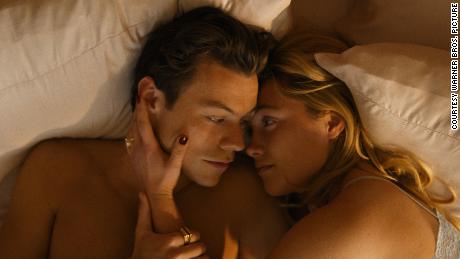The darkly mysterious concept represents a marked departure from Wilde’s impressive debut with “Booksmart,” a small coming-of-age movie that hit all the right notes. Given a chance to step up in class, the actor turned director has assembled a topnotch cast, but in a story that teases the buildup a bit too long and doesn’t pay it off very neatly; indeed, the ending becomes what the movie’s driving force speaks of endeavoring to avoid — namely, chaos.
Owing a spiritual debt to “The Stepford Wives” with its carefully manicured image of suburbia, there are plenty of more recent points of comparison as well, such as the George Clooney-directed “Suburbicon.” There’s even a dollop of “Edward Scissorhands” in the pastel vision of a perfect cul de sac where the menfolk drive single file to work while their wives dutifully wave goodbye.
Alice (Pugh) and her husband Jack (Harry Styles) appear to be living the dream, partying hard with his coworkers in the 1950s-style planned community where they all live. The two are insanely hot for each other, almost sickeningly so to hear Alice’s pal Bunny (played by Wilde) tell it.
Looking closer, though, it all seems a little too perfect, and thus suspicious, beginning with the fact that nobody will explain what exactly it is they do working for something called the Victory Project. There’s also a cult-like devotion to the boss, Frank (Chris Pine, like Pugh, a cut above the material), who gets his charges to enthusiastically embrace that they’re “changing the world.”
If the goal is a kind of happy-talk conformity, that gives way to what resembles gaslighting when Alice begins to sense that something’s wrong, fueled by strange dreams, surreal images and the behavior of a neighbor.
Based on a script credited to Shane and Carey Van Dyke (Dick Van Dyke’s grandsons) along with “Booksmart’s” Katie Silberman, “Don’t Worry Darling” stumbles into the creative trap of following the model of a “The Twilight Zone” episode, just without the sort of revelation that would lift it into that series’ more memorable tier. While the film has something to say about gender politics and misogyny, it’s not articulated well enough to distinguish itself from any number of other movies.
Given that, the question posed by the New York Times regarding the controversy regarding the off-screen relationships — “Will the Spiraling Publicity Harm ‘Don’t Worry Darling’ at the Box Office?” — seems precisely upside down; rather, the real issue is whether that curiosity, including the Zapruder film-like analysis of the stars at the Venice Film Festival premiere, can spur interest in an otherwise nondescript movie? (The film is being released by Warner Bros., like CNN, a unit of Warner Bros. Discovery.)
Practically speaking, despite the heat surrounding Styles as he steps up his acting career, the primary draw should be Pugh, whose growing profile — with an Oscar nomination for “Little Women,” “Black Widow” and the upcoming “Dune” — will see her in another movie, “Wonder,” come November.
After Wilde’s impressive debut, there’s invariably anticipation to see if a filmmaker can pull off another success. By that measure “Don’t Worry Darling” feels more like a modest setback than a major disappointment, but ultimately, it’s hard to call this project as a victory.
“Don’t Worry Darling” premieres in US theaters on September 23. It’s rated R. The film is distributed by Warner Bros. Studios, which like CNN is part of Warner Bros. Discovery.


